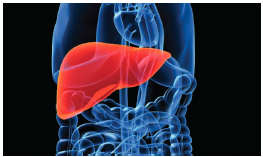This study examined the effects of omega-3 fatty acids on liver fat content in PCOS using proton magnetic resonance spectroscopy. A total of 25 women with PCOS (mean age, 32.7 yr; mean body mass index, 34.8 kg/m(2)) were enrolled in a randomized, crossover study to receive either 4g/d of omega-3 fatty acids (83% combined EPA and DHA) or placebo over 8 wk. Omega-3 fatty acids significantly decreased liver fat content compared with placebo [10.2 (1.1) vs. 8.4 (0.9)%; P = 0.022]. There was also a reduction in triglycerides [1.19 (1.03-1.47) vs. 1.02 (0.93-1.18) mmol/liter; P = 0.002], systolic blood pressure [124.1 (12.1) vs. 122.3 (14.5) mm Hg; P = 0.018], and diastolic blood pressure [73.2 (8.4) vs. 69.7 (8.3) mm Hg; P = 0.005] with omega-3 fatty acids compared with placebo. Omega-3 fatty acids especially decreased hepatic fat in women with hepatic steatosis, defined as liver fat percentage greater than 5% [18.2 (11.1) vs. 14.8 (9.3)%; P = 0.03]. Omega-3 fatty acid supplementation has a beneficial effect on liver fat content and other cardiovascular risk factors in women with PCOS, including those with hepatic steatosis. (J Clin Endocrinol Metab. 2009 Oct;94(10):3842-8.) PMID: 19622617.
Home Research News Omega-3 fatty acids decrease liver fat content in PCOS: proton magnetic resonance...









